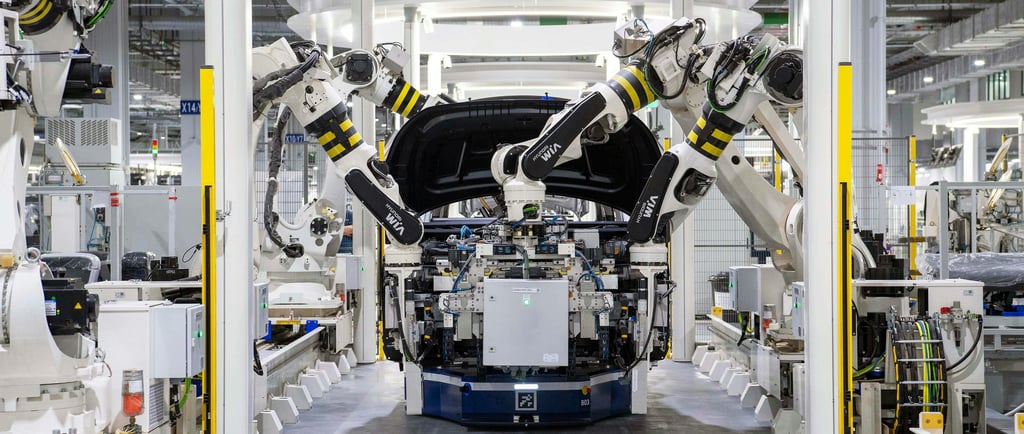From Scrap to Smart Manufacturing: The Role of Metal Recycling in Industry 4.0
Industry 4.0 is revolutionizing metal recycling with AI, IoT, and automation. This blog explores how smart technologies enhance efficiency, optimize supply chains, and drive sustainability in modern manufacturing
METAL SCIENCE & INDUSTRIAL TECHNOLOGY


The manufacturing industry is undergoing a massive transformation, driven by the digital revolution known as Industry 4.0. This new era, marked by the integration of Internet of Things (IoT), artificial intelligence (AI), automation, and big data analytics, is reshaping industries—including metal recycling.
Metal recycling, a critical component of sustainable manufacturing, has traditionally been a labor-intensive process. However, with smart technologies, modern recycling facilities are leveraging AI algorithms, IoT-enabled sensors, and data analytics to enhance efficiency, reduce waste, and optimize supply chains.
In this article, we’ll explore how Industry 4.0 is revolutionizing metal recycling, the benefits of digital transformation, and how businesses can capitalize on these technologies to build a more resilient and sustainable manufacturing ecosystem.
The Digital Transformation of Metal Recycling
The adoption of Industry 4.0 technologies in metal recycling isn’t just about improving efficiency—it’s about creating an interconnected and intelligent recycling ecosystem.
Challenges in Traditional Recycling
Manual sorting and outdated machinery lead to inefficiencies.
High energy consumption and material loss drive up costs.
Supply chain inefficiencies cause delays and unpredictability.
How Smart Technologies are Changing Metal Recycling
Automated sorting with AI-powered robotics.
IoT sensors to monitor and analyze scrap metal supply chains.
Digital twins for real-time waste reduction and resource recovery.
Predictive maintenance to minimize downtime.
Big data analytics for better decision-making and efficiency.
By integrating AI, IoT, and advanced data analytics, companies can extract more value from scrap metal, reduce operational costs, and drive a circular economy.
The Role of IoT in Metal Recycling
IoT is making scrap metal processing smarter, faster, and more efficient. By integrating IoT sensors and connected devices into equipment and vehicles, real-time data can improve operational decision-making.
Key Applications of IoT in Metal Recycling
1. Smart Sorting Systems
IoT-enabled optical and electromagnetic sensors identify and separate different metals.
Ensures high-quality recycled materials and reduces contamination.
2. Supply Chain Optimization
IoT trackers and RFID tags provide real-time location tracking for scrap metal shipments.
Minimizes loss and delays, ensuring an optimized supply chain.
3. Energy Consumption Monitoring
IoT sensors track energy usage in recycling facilities.
Helps companies optimize power consumption and reduce carbon footprint.
4. Predictive Maintenance
IoT-powered analytics detect wear and tear in recycling machinery.
Prevents unexpected failures, keeping operations efficient.
Case Study: IoT-Enabled Smart Recycling in Action
A leading metal recycling company, EMR Metal Recycling, implemented IoT-based machine monitoring, resulting in:
✅ 20% energy consumption reduction.
✅ 30% less equipment downtime, saving millions of dollars.
✅ 15% improvement in logistics efficiency.
By implementing IoT solutions, recycling facilities are becoming more intelligent, allowing for seamless data exchange across production pipelines.
AI-Powered Analytics: Turning Scrap into Smart Materials
AI is transforming metal sorting, processing, and decision-making by enabling high-speed, data-driven recycling processes.
How AI Enhances Metal Recycling
1. Automated Scrap Identification
AI-powered image recognition systems analyze metal scrap in real-time.
Precisely distinguishes ferrous from non-ferrous metals for accurate sorting.
2. Efficient Material Recovery
Machine learning algorithms detect impurities in scrap metal.
Optimizes recovery rates, reducing material waste.
3. Dynamic Pricing & Market Prediction
AI-driven analytics forecast metal price fluctuations.
Recyclers can sell at optimal rates, ensuring steady supply for manufacturers.
4. Reducing Contamination in Recycled Materials
AI consistently monitors chemical compositions in scrap metal.
Increases purity, making recycled metals more suitable for industrial use.
AI in Action: The TOMRA Sorting System
The TOMRA Sorting System, using deep learning AI, hyperspectral imaging, and machine learning models, has achieved: ✅ 99% accuracy rate in scrap classification.
✅ Higher-purity metal recovery, essential for industries reliant on secondary raw materials.
With AI-driven insights, recyclers can make smarter decisions, improve efficiency, and reduce environmental impact, making Industry 4.0 a game-changer in sustainable metal processing.
Smart Manufacturing: Bridging the Gap Between Recyclers and Industrial Supply Chains
One of the biggest impacts of Industry 4.0 in metal recycling is how it connects recyclers with manufacturers.
Problems with Traditional Recycling Supply Chains
Inconsistent material quality due to multiple intermediaries.
Supply chain inefficiencies lead to delays and rising costs.
Lack of real-time tracking makes it harder to optimize logistics.
How Smart Manufacturing Supports Metal Recycling
1. Blockchain for Supply Chain Transparency
Ensures verified origins and quality assurances of recycled metals.
Provides full traceability, reducing dependence on virgin materials.
2. Digital Twins for Process Optimization
Simulates real-world recycling operations for optimization.
Reduces waste and enhances predictive quality control.
3. AI-Driven Demand Forecasting
Uses historical data to predict demand for recycled metals.
Prevents overproduction and reduces storage costs.
4. Automated Quality Control
AI and IoT integrate real-time quality checks in recycling plants.
Ensures recycled metals meet industrial-grade standards.
With smart automation, metal recycling is evolving to meet modern manufacturing demands, creating a circular, resource-efficient industrial ecosystem.
The Future of Metal Recycling in Industry 4.0
As we move further into the Industry 4.0 era, the potential for smart recycling solutions will continue to expand.
Key Trends to Watch
AI-powered hyper-efficient metal sorting for near-zero waste.
IoT-enabled supply chain monitoring for optimized logistics.
Industry-wide adoption of blockchain for transparent material sourcing.
Larger investments in digital infrastructure for smart metal recycling.
The shift from scrap to smart manufacturing isn’t just a trend—it’s the future of sustainable, data-driven industry practices.
Final Thoughts
The convergence of metal recycling and Industry 4.0 is ushering in a new era of: ✅ Efficiency
✅ Sustainability
✅ Profitability
For companies looking to stay ahead in this digital revolution, investing in smart technologies isn't optional—it’s essential.
By integrating IoT, AI, and automation, businesses can redefine how scrap metal is sorted, processed, and supplied to industries, leading to a more circular and resource-efficient world.
Would you like to explore specific case studies of smart metal recycling in action? Let us know in the comments below!
